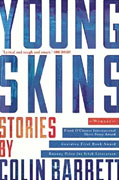Young Skins: Stories
Colin Barrett
book reviews:
· general fiction
· chick lit/romance
· sci-fi/fantasy
· graphic novels
· nonfiction
· audio books
· author interviews
· children's books @
curledupkids.com
· DVD reviews @
curledupdvd.com
newsletter
win books
buy online
links
home
for authors
& publishers
for reviewers

 |
Young Skins: Stories Colin Barrett Grove Press Paperback 224 pages March 2015 |
|
In Young Skins
These confrontations enhance Barrett’s realism and accentuate the adversity thrust upon those who, despite all obvious knowledge, find themselves suddenly as adults. Often, the confrontations culminate in violence that furthers the plot by making events seem more realistic. In “Stand your Skin,” a good story that references a previously mentioned figure, there is an event of arbitrary violence that shapes the development of the main character. The consequences of violence are painfully displayed in “Calm With Horses,” a story that takes far too long to develop but resolves strongly. One of Barrett’s skills is that he achieves something that many other contemporary writers struggle with: he smoothly places our ever-advancing modern age into his stories as opposed to awkwardly forcing his tales into the world we live in. Twenty-first century fiction has not exactly mastered modern technology; too often, the presence of computers and cell phones is clumsily inserted to provide setting and detracts from the story, or technology usurps the plot until all feeling is lost and the writing becomes dry. Barrett, however, carefully sidesteps these issues without completely avoiding them: his use of technology enhances the stories, gently reminding readers that this is modern Ireland without interrupting the flow of the narrative. A prominent example of this is “The Moon” where a text message (instead of a phone call) emphasizes the internal isolation of the main character and his inability to make a connection. As Barrett connects to readers, they will find that his writing is unmistakably Irish. The setting is often bars and clubs of small Irish towns, and the dialogue is smattered with Irish expressions and slang that leaves casual readers to the mercy of context. Slight language barrier aside, Barrett’s style is direct and his prose is clear enough so that even generalities seem precise. Take, for example, the opening to “Bait,” which begins: “This was a summer night about a thousand years ago …” (19). Such an opening places the reader not in the setting but in the mind of the character, an older narrator recalling a youth that seems an impossible amount of time away. So while readers mostly experience the uncertainty and turbulence of young adulthood firsthand, in some of the stories readers find a bittersweet commingling of nostalgia and regret in reflection upon past times. An example of this is “Kindly Forget My Existence,” the collection’s last story, which beautifully describes two middle-aged men who avoid the funeral of a friend estranged to them mostly by the passage of time since their early adulthood. “Cowards were cowards, Doran considered ruefully, but they required conviction to be so – the brave thing was usually the easier thing” (193). Barrett consistently places such wonderfully-worded phrases throughout his stories to provide an insight into characters who it seems will never be at home in their own skins--whether they are younger or otherwise--because they are too bothered by decisions made in their young adulthood. In this way, Barrett shows that people possess the capability for personal growth, though it may not always coincide with their natural growth. Such is the way that Barrett connects to all readers. The decisions made by the young adults of these stories, just like those made in reality, have long repercussions that shape the rest of adulthood. These modern-day tales enhance literature’s examination of youth by showing the irony that it is in our “young skins”--where we are least prepared to make difficult choices--that we are often forced to do so. Such a circumstance is unfair and frustrating, but it is true, and Barrett illustrates this sad truth admirably. Originally published on Curled Up With A Good Book at www.curledup.com. © Joshua Myers, 2015 |
|
|
|
 Click here to learn more about this month's sponsor! |
|
| fiction · sf/f · comic books · nonfiction · audio newsletter · free book contest · buy books online review index · links · · authors & publishers reviewers |
|
| site by ELBO Computing Resources, Inc. | |
 The themes of lost youth and adult adversity are immediately evident in the first story, “The Clancy Kid,” which is the best of the collection’s seven tales. In this particular story, two young men discuss the disappearance of a local child when they have an upsetting encounter with the ex-girlfriend of one of them. The literal missing child mirrors the metaphorical missing child of the characters’ youth, and sudden confrontations with the past show how these characters cope with the losses they suffer.
The themes of lost youth and adult adversity are immediately evident in the first story, “The Clancy Kid,” which is the best of the collection’s seven tales. In this particular story, two young men discuss the disappearance of a local child when they have an upsetting encounter with the ex-girlfriend of one of them. The literal missing child mirrors the metaphorical missing child of the characters’ youth, and sudden confrontations with the past show how these characters cope with the losses they suffer.